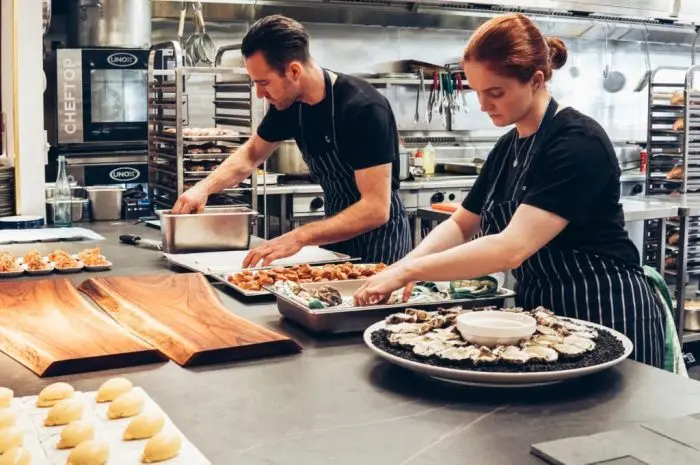Developing a unique culinary business in your city can be a rewarding endeavor, offering the opportunity to share your passion for food with the community while building a successful and profitable venture.
However, the restaurant industry is highly competitive, and standing out requires creativity, innovation, and careful planning.
In this comprehensive guide, we’ll explore a variety of tips for success in developing a unique culinary business in your city, helping aspiring entrepreneurs navigate the challenges and maximize their chances of success.
Also Read
1. Identify Your Unique Selling Proposition (USP)
Start by identifying your unique selling proposition (USP) – what sets your culinary business apart from others in the area? Whether it’s a signature dish, a unique dining concept, or a commitment to using locally-sourced ingredients, your USP will differentiate your business and attract customers.
Related Topics: How to Get Cheap Used Car Loans (Low Down Payment & Installments)
2. Conduct Market Research
Conduct thorough market research to understand the local culinary landscape, identify gaps or opportunities in the market, and assess the demand for your concept. Analyze competitors, target demographics, and consumer preferences to tailor your offerings to meet the needs of your target audience.
3. Develop a Strong Brand Identity
Invest in developing a strong brand identity that reflects your culinary vision, values, and personality. From the name and logo to the interior design and ambiance, every aspect of your brand should convey a cohesive and memorable experience for your customers.
4. Create a Unique Menu
Craft a menu that showcases your culinary expertise and highlights your unique offerings. Experiment with innovative flavor combinations, locally-sourced ingredients, and creative presentation to create a memorable dining experience that keeps customers coming back for more.
5. Focus on Quality and Consistency
Maintain a strong focus on quality and consistency in every aspect of your culinary business – from the ingredients and preparation to the service and presentation. Consistently delivering high-quality food and service will build trust and loyalty among your customers and set you apart from competitors.
6. Embrace Sustainability and Ethical Practices
Embrace sustainability and ethical practices in your culinary business by sourcing ingredients responsibly, minimizing food waste, and supporting local farmers and producers. Communicate your commitment to sustainability to attract environmentally-conscious customers and differentiate your brand in the market.
7. Create a Memorable Dining Experience
Focus on creating a memorable dining experience for your customers by paying attention to the details – from the ambiance and decor to the service and hospitality. Personalize the experience for each guest and exceed their expectations to leave a lasting impression and encourage repeat business.
8. Build Relationships with Suppliers and Partners
Build strong relationships with suppliers, farmers, and other partners in the local food ecosystem. Cultivating these relationships can help you access high-quality ingredients, negotiate better pricing, and support the community while building a network of support for your culinary business.
9. Leverage Technology and Social Media
Utilize technology and social media to promote your culinary business and engage with customers online. Create an attractive website, establish a presence on social media platforms, and leverage online reservation systems and delivery services to reach a wider audience and drive sales.
Read: How to Get Cheap Used Motorbike Credit (Low Down Payment & Installments)
10. Seek Feedback and Continuously Improve
Seek feedback from customers, employees, and industry experts to identify areas for improvement and refine your culinary business over time. Actively listen to customer feedback, monitor online reviews, and stay open to constructive criticism to ensure you’re meeting customer expectations and staying ahead of the competition.
11. Stay Flexible and Adapt to Changes
The culinary industry is constantly evolving, and successful businesses must stay flexible and adapt to changes in the market. Keep an eye on industry trends, consumer preferences, and emerging technologies, and be willing to pivot your business model or offerings as needed to stay relevant and competitive.
12. Stay Committed and Passionate
Above all, stay committed and passionate about your culinary business. Building a successful venture takes time, hard work, and dedication, but with perseverance and a genuine love for food and hospitality, you can overcome challenges and achieve your goals in the competitive culinary landscape.
Conclusion
Developing a unique culinary business in your city requires careful planning, creativity, and a commitment to excellence. By identifying your unique selling proposition, conducting market research, developing a strong brand identity, creating a unique menu, focusing on quality and consistency, embracing sustainability, creating a memorable dining experience, building relationships with suppliers, leveraging technology and social media, seeking feedback, staying flexible and adaptable, and staying committed and passionate, you can set yourself up for success and build a thriving culinary business that delights customers and stands the test of time. With dedication, creativity, and a love for food, the possibilities for culinary success in your city are endless.


















